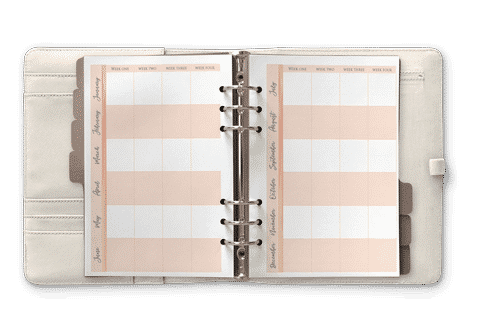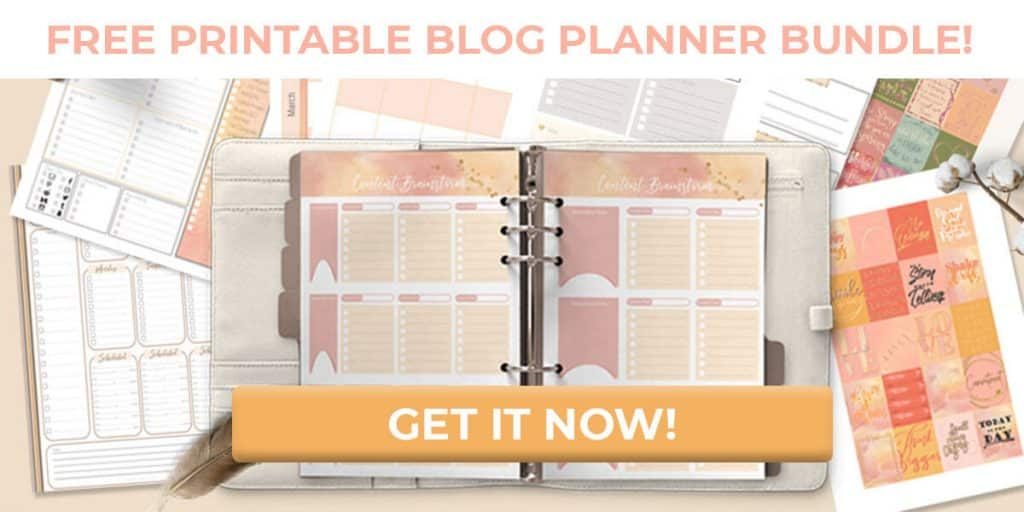How to Create a Strong Content Calendar the Easy Way
Welcome back to part two if the blog planner series, the yearly content calendar! In the first post in this series, we did a brainstorm of all the ideas, categories and topics you can think of to make your blog interesting and relevant to a specific reader.
Now we’re going to do some research to get more ideas. We will consolidate all your thoughts into specific categories, and we’re going to create a content calendar for the year that you will incorporate into your blog planner.
I hope you’ve had a chance to download everything you had up in your head because it’s time to take it a step further.
As much as we like to believe we have all the answers, we don’t. It’s tempting to stop with our best ideas and start writing. We’re not writing to read our own work. Your blog is for your readers. Since your blog is for them, you have to write what they want.
Download the Content Calendar Worksheet
I created a free printable content calendar specifically designed for broad planning. Blog planners can get very specific but if you’re planning out content a year in advance, general broad planning of categories is best. It can serve as a guide and help you stay on track with your topics. To download this free printable just click the download button below.

Surveying Your Audience
I have a few resources for you to work with to draw out even more ideas and to get into the mind of your audience just a little bit more. To create a content calendar you need to find out what your readers want from you. Don’t worry. You don’t need an existing audience or tons of experience to do this either.
If you’re an experienced blogger, you might already be talking directly to your target audience, and you probably have a good understanding of what your readers want because they’re asking you for it.
If you have access to your readers through an email list or some other means, you want to talk to them first and create a blog plan based off of that information. For anyone who is not that far along yet, stick with me.
Why This is Important
Whether you’re a seasoned blogger or just starting out, you will benefit from learning how people search. It’s valuable to know what questions they ask and how they ask those questions. You need this to get a better understanding of what you actually need in your blog plan and content calendar.
For those just starting out, your audience probably hasn’t found you yet. So how do you find out what they want? Here are five ideas for writing for your audience before you have one.
Five Resources for Finding Topics, Ideas, and Answers for the Content Calendar
Understanding your audience doesn’t have to be complicated. There’s no need to dive into analytics charts and scour through data tables to find it. All you have to do is listen and learn. Here are five places to start.
Answer the Public
The first resource is a website called Answer The Public. This website takes your base words and ideas and expands them into questions, phrases, and alternatives for your keywords. Google takes these questions from actual searches. Then displayed in an organized way either visually and on cards sorted alphabetically.
Why this is helpful
You know what you want to talk about on your blog. Answer the Public gives you new angles on your subject you might not have thought of yet.
Facebook Groups
The second resource is Facebook. Specifically, Facebook groups for your target audience. I join Facebook groups to get an idea of what people are asking.
In fact, the idea for this portion of my post came from a Facebook group. Someone asked a question on how to find topics for their blog posts. The thread got such a massive response. I knew it was something people are interested.
You can also survey your Facebook groups with a Google form. You can also make one in Survey Monkey, whatever you prefer. Ask the group admin for permission first, of course. Posting a survey in a targeted group is a great way to get your survey in front of thousands of people in your target market.
Running a survey can generate tons of valuable information targeted to your demographic. As a bonus, this is also a neat and concise way to store data about your target demographic.
Quora
If you’re not using Quora to either ask a question or sift through questions others have already asked, you are missing out. Quora is a great way to survey with a question or to research what people are asking. Help someone else out by answering a few questions too!
Quora is a great resource for creating a broad content calendar bloggers that do not have a defined audience yet.
The information available on the Reddit platform is endless. You can find conversations, questions, and answers to anything you can imagine. For a beginner, Reddit can be a little confusing. It takes some time to find quality subreddits but they are out there, and they’re super valuable once you’ve discovered them.
Granted, Reddit will take more work but the mix of people and the super-niche topics are incredible sources of valuable information for your content calendar.
Google Search
The simplest way to find out what people are searching for is to start typing a question into Google. See what pops up as suggested finishes to the phrase. You can also type in a few keywords and hit search and scroll to the bottom of the search results to get Googles related searches.
The benefit of finding ideas for your content calendar in this way is that it’s coming from Google. For this reason, you know these are real searches and things that people want to know.
Streamlining Your Content Calendar Categories
Now you have a massive list of topics. A good understanding of what people are saying they want to read. You also have an excellent foundation for your blog plan. The next step is to take all of that and put it into simple and clear categories. These categories will be the core of your yearly content calendar.
I know you set up initial categories for your blog plan in the first exercise. However, it’s time to combine and refine all your topics into streamlined categories.
Consolidating your categories will help your readers find what they’re looking for quickly. Additionally, streamlining groups of ideas will help you set up a bird’s eye view of your yearly content calendar.
Why this is Important
It can be challenging to plan out topics a year in advance. You should think of this yearly content calendar as a flexible guide rather than a strict rule. Having this general calendar in your blog plan will help you identify categories where your information is thin. Having this will help you focus on those topics.
It’s important to remember that the yearly content calendar is not set in stone. However, it will give your blog topics even representation over time. A content calendar will keep you as focused as possible on your niche topic. It’s easy to wander into areas that don’t make sense for your blog. It’s worth having as a guideline to keep you on track.
What’s Next?
If you haven’t read part one of this series and downloaded the first worksheet in the blog plan, please do that before beginning any work on your content calendar. It’s important to start small and not overwhelm yourself. You don’t want to miss something important because you’re overwhelmed and rushing through the process.
If you’re blogging professionally, blog planning is a significant step. The worksheets are cute and intended to be fun but don’t underestimate the work that you’re doing by creating a robust blog plan for your business.
Next week I will give you the third part of this blog plan which will include the post planner. The post planner is a detailed worksheet designed to take you through every aspect of writing a post, developing graphics as well as marketing and promotion.
I hope you come back next week for the post planner. If you’re new to blogging this will be a lifesaver when you’re still trying to get a routine down. For more planning printables check out my weekly big list weekly planner and goal setting worksheets here and here.
If you like this post, please subscribe to the newsletter for even more great topics on blog design and marketing. You will receive exclusive discounts in the shop. Also, you get a monthly newsletter with direct links to all the freebies on the blog and in the shop!




